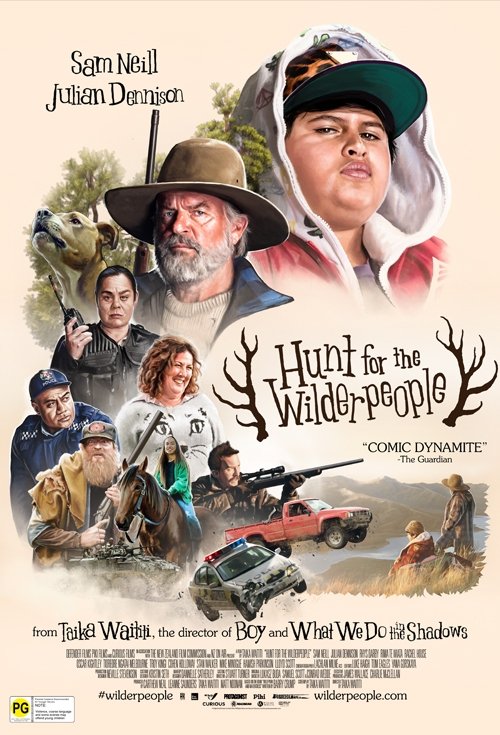Hunt for the Wilderpeople
NZ release: 31 March 2016
Violence, coarse language, some scenes may disturb young children Rated on: 08 July 2016

What’s it about?
After a rebellious kid, Ricky Baker, and his foster uncle leave their farm and go missing in the wild New Zealand bush, a national manhunt starts to return Ricky to foster care.
The facts
- Directed by Taika Waititi (Thor: Ragnarok, Jojo Rabbit, Boy)
- English language
- Runtime: 101 minutes
- This is the highest-grossing New Zealand film of all time.
- Won six awards at the New Zealand Film and TV Awards 2017 for Best Actor, Director, Film, Supporting Actor, Supporting Actress, and Visual Effects.
Why did it get this rating?
This film game was cross-rated by the Film and Video Labelling Body. You can find out more about cross-rating here.
Violence
There is limited violence in the film however there is some gun violence, bloody injuries and violence against animals. The strongest scenes include:
- A character and his dog are hurt in an attack by a wild boar. The dog is badly injured, with some blood visible on its fur. The character makes the difficult decision to put the dog down. This happens offscreen, but we hear the gunshot, making it a very emotional scene.
- In two separate scenes, a wild boar is killed—once with a knife and another time with a gun. These scenes are intense, with blood shown, and might upset younger viewers or anyone uncomfortable with animal harm.
- A man is shot in the buttocks, but the scene is comical, not graphic.
- A man twists his ankle on a tree root, and we hear it crack, but no injury is shown.
Sad scenes
After the sudden death of a character, another character lies over the body, visibly heartbroken. While the death itself is not shown, this scene may be upsetting for viewers, especially those who have experienced a similar loss.
Offensive language
Words like “d*ck,” “wanker,” “bastard,” and “asshole” are mentioned. The words are mostly used in a humorous context and sometimes in a song, poem, funny story or joke.
Alongside the offensive language the film features Kiwi humour, which can be blunt and direct. This includes moments where a character lies about being molested to avoid capture by the police and another instance where a character makes a comment that implies, they were sexually assaulted.
Although these are serious topics, the humour, combined with a sense of childlike innocence, softens the impact of the language and situations. The offensive language and jokes are presented in a light-hearted way, but some viewers may not find them amusing.
When content stays with you:
We all have our boundaries, and it’s completely okay if something you’ve watched is weighing on your mind. If certain content lingers with you, consider having a chat with friends or whānau to debrief about what you’ve just seen. But if you’re still feeling affected, please reach out to any of the following helplines for support.
Further information
Recent featured decisions
Content that may disturb
In a live special, free solo climber Alex Honnold scales one of the world’s tallest skyscrapers in Taipei, Taiwan. With no ropes or safety gear, audiences around the world watch as he slowly and methodically makes his way to the top.
Violence, sex scenes, offensive language, nudity & wound detail
In 1950’s New York, shoe salesman Marty Mauser chases his dream to become a table tennis champion regardless of the cost to those around him.

